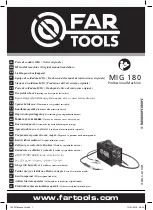
- 11 -
INSPECTION
Since the siren is an emergency warning device which will get minimal
3.Inspect control panel door gasket and interior to determine
operational use, very little operational wear is to be anticipated.
that no water leakage exists.
Periodic operational tests should be made to verify function ability. The
frequency of testing is considered to be a local option. Once every six
4.Remove fiberglass hood from motor compartment and
months, or at other optional intervals, perform the following inspections:
check gear reducer oil level. Add or change as necessary.
Refer to MAINTENANCE INSTRUCTIONS under
1. Inspect external fiberglass surfaces for any physical damage.
"LUBRICATION."
2. Inspect screened openings to determine that they are unobstructed
5.While fiberglass hood is removed, inspect collector rings and that
screens are securely
fastened.
brushes. Clean and polish as necessary.
If deeply scored or burned, replace rings and brushes. Refer to
MAINTENANCE INSTRUCTIONS under "CLEANING COLLECTOR
RINGS."
6. Inspect rotating chain drive mechanism under siren base. Apply grease and
check chain tension. Refer to MAINTENANCE INSTRUCTIONS under
"LUBRICATION" and "ADJUSTING CHAIN DRIVE
TENSION."
DISASSEMBLY, REPAIR, REPLACEMENT AND
REASSEMBLY
The siren' s physical design is such that it precludes most mechanical
problems other than those caused by natural disasters or violent physical
damage. The siren configuration is constructed from reinforced fiberglass and
bolted together to form a weatherresistant enclosure for all moving parts.
The parts drawing (Figure 15) illustrates component placement. Upon
removal of the fiberglass hood, the electric motor, gear reducer, jaw coupling,
collector ring assembly and torque adjusting spring are exposed to view. The
chain drive assembly is always accessible from the underside of the protective
base cover.
Disassembly procedures are extremely simple and will become obvious to the
mechanic, depending on the parts or components needing service. Ordinary
mechanics tools are adequate for all service work. Refer to MAINTENANCE
PROCEDURES for servicing and lubricating instructions.
PREPARATION FOR RESHIPMENT
Should the siren need to be relocated, the following procedures should be
followed:
1.
Disconnect all controls and electrical connections.
2.
Remove magnetic starter control cabinet.
3.
Provide means of lifting the siren from its mount.
4.
Unfasten from the mount and lower to the ground.
5.
Horn may be removed for transporting or shipping.
6.
Provide suitable shipping mount or crate.
STORAGE
No special precautions are necessary except that the unit should never be
submerged in water or other damaging fluids.



































